六年级上册英语复习资料
最新完整版人教版六年级英语上册总复习各单元知识点归纳总结及作文范文汇总
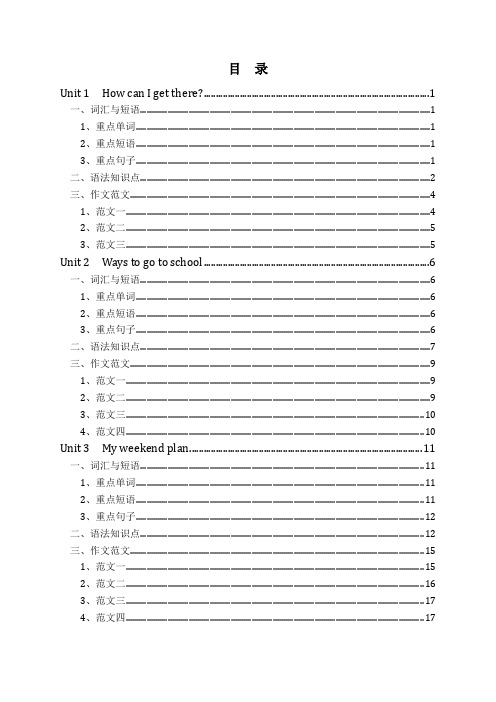
目录Unit 1 How can I get there? (1)一、词汇与短语 (1)1、重点单词 (1)2、重点短语 (1)3、重点句子 (1)二、语法知识点 (2)三、作文范文 (4)1、范文一 (4)2、范文二 (5)3、范文三 (5)Unit 2 Ways to go to school (6)一、词汇与短语 (6)1、重点单词 (6)2、重点短语 (6)3、重点句子 (6)二、语法知识点 (7)三、作文范文 (9)1、范文一 (9)2、范文二 (9)3、范文三 (10)4、范文四 (10)Unit 3 My weekend plan (11)一、词汇与短语 (11)1、重点单词 (11)2、重点短语 (11)3、重点句子 (12)二、语法知识点 (12)三、作文范文 (15)1、范文一 (15)2、范文二 (16)3、范文三 (17)4、范文四 (17)Unit 4 I have a pen pal (18)一、词汇与短语 (18)1、重点单词 (18)2、重点短语 (18)3、重点句子 (18)二、语法知识点 (19)三、作文范文 (23)1、范文一 (24)2、范文二 (24)3、范文三 (25)4、范文四 (25)Unit 5 What does he do (27)一、词汇与短语 (27)1、重点单词 (27)2、重点短语 (27)3、重点句子 (27)二、语法知识点 (28)三、作文范文 (30)1、范文一 (30)2、范文二 (31)3、范文三 (31)Unit 6 How do you feel (32)一、词汇与短语 (32)1、重点单词 (32)2、重点短语 (32)3、重点句子 (32)二、语法知识点 (33)三、作文范文 (34)1、范文一 (35)2、范文二 (35)3、范文三 (35)4、范文四 (35)语法知识点 (37)肯定句如何变否定句 (37)肯定句如何变一般疑问句 (39)划线部分提问(如何变特殊疑问句) (41)写作训练 (43)写作训练答案 (47)Unit 1 How can I get there?一、词汇与短语1、重点单词1.science /ˈsaɪəns/ 科学2.museum /mjuˈziːəm/ 博物馆3.post office /ˈpəʊst ɒfɪs/ 邮局4.bookstore /ˈbʊkstɔː/ 书店5.cinema /ˈsɪnəmə/ 电影院6.hospital /ˈhɒspɪtl/ 医院7.crossing /ˈkrɒsɪŋ/ 十字路口8.turn /tɜːn/ 转湾9.left /left/ 左10.right /raɪt/ 右11.straight /streɪt/ 笔直地12.ask /ɑːsk/ 问13.sir /sɜː(r)/ (对男子的礼貌称呼)先生14.interesting /ˈɪntrəstɪŋ/ 有趣的15.Italian /ɪˈtæliən/ 意大利的16.restaurant /ˈrestrɒnt/ 餐馆17.pizza /ˈpiːtsə/ 比萨饼18.street /striːt]/ 大街;街道19.get /get/ 到达20.gave /ɡeɪv/( give/ɡɪv/的过去式) 给21.follow /ˈfɒləʊ/ 跟着22.tell /tel/ 告诉2、重点短语1.science museum 科学博物馆2.near the library 图书馆附近3.get there 到达那里4.go straight 直走5.turn left/right 向左转/右转6.over there 在那边7.next to the museum 在博物馆旁边8.pet hospital 宠物医院9.Palace museum 故宫博物院10.in front of 在…前面11.behind the post office 在邮局后面12.beside the park 在公园旁边13.be far from 离……很远14.be far from home 远离家乡3、重点句子1. --Where is the museum shop?博物馆商店在哪里--It's near the door. 它在门附近。
EEC英语六年级上册复习资料第一课
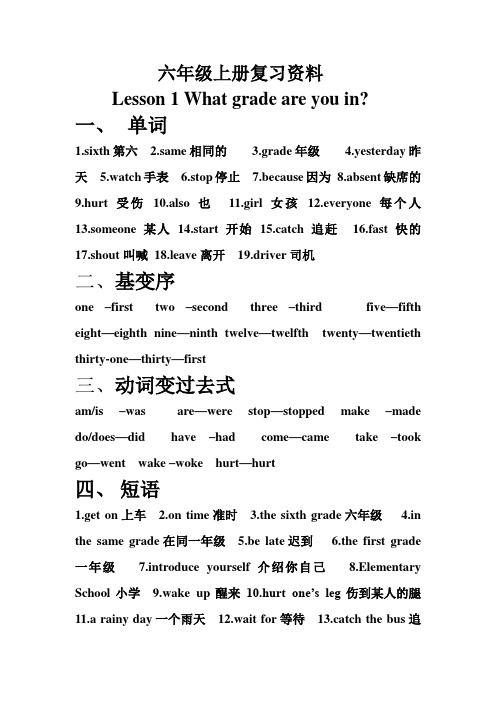
六年级上册复习资料Lesson 1 What grade are you in?一、单词1.sixth第六2.same相同的3.grade年级4.yesterday昨天5.watch手表6.stop停止7.because因为8.absent缺席的9.hurt受伤10.also也11.girl女孩12.everyone每个人13.someone某人14.start开始15.catch追赶16.fast快的17.shout叫喊18.leave离开19.driver司机二、基变序one –first two –second three –third five—fifth eight—eighth nine—ninth twelve—twelfth twenty—twentieth thirty-one—thirty—first三、动词变过去式am/is –was are—were stop—stopped make –made do/does—did have –had come—came take –took go—went wake –woke hurt—hurt四、短语1.get on上车2.on time准时3.the sixth grade六年级4.in the same grade在同一年级5.be late迟到6.the first grade 一年级7.introduce yourself介绍你自己8.Elementary School小学9.wake up醒来10.hurt one’s leg伤到某人的腿11.a rainy day一个雨天12.wait for等待13.catch the bus追赶汽车14.bus driver汽车司机五、句子Let’s Have Fun 1What grade are you in ? 你在几年级?I’m in the sixth grade.我在六年级.Oh, we’re in the same grade. 哦,我们在同一年级。
六年级上册英语复资料

六年级上册英语复资料以下是六年级上册英语复习资料,包括一些重点词汇、短语和句子,以及一些常见的语法知识点。
重点词汇:1. subject 科目2. math 数学3. science 科学4. social studies 社会研究5. English 英语6. Chinese 语文7. music 音乐8. art 美术9. physical education 体育10. library 图书馆常见短语:1. have a good day 过得愉快2. see you later 待会儿见3. have a good time 过得开心4. let me know 让我知道5. have a look 看一看6. have a seat 请坐7. what about you 你呢8. I don’t know 我不知道9. I think so 我认为如此10. I’m not sure 我不能确定常见句子:1. What’s your favorite subject? 你最喜欢的科目是什么?2. I like math because it’s fun. 我喜欢数学因为它很有趣。
3. Do you like science? 你喜欢科学吗?4. Yes, I do. 是的,我喜欢。
5. No, I don’t. 不,我不喜欢。
6. What’s your favorite sport? 你最喜欢的运动是什么?7. My favorite sport is basketball. 我最喜欢的运动是篮球。
8. When do you usually get up? 你通常什么时候起床?9. I usually g et up at 7 o’clock. 我通常在7点钟起床。
10. How many hours do you sleep every night? 你每晚睡多少小时?语法知识点:1. 现在进行时:表示正在进行的动作或状态,结构为“be动词+动词ing”。
六年级英语上册期末复习资料
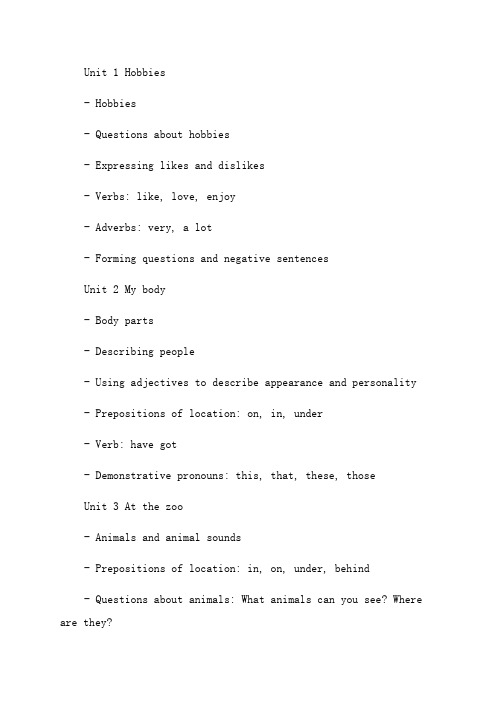
Unit 1 Hobbies- Hobbies- Questions about hobbies- Expressing likes and dislikes- Verbs: like, love, enjoy- Adverbs: very, a lot- Forming questions and negative sentencesUnit 2 My body- Body parts- Describing people- Using adjectives to describe appearance and personality - Prepositions of location: on, in, under- Verb: have got- Demonstrative pronouns: this, that, these, thoseUnit 3 At the zoo- Animals and animal sounds- Prepositions of location: in, on, under, behind- Questions about animals: What animals can you see? Where are they?- Adjectives: big, small, tall, short, long, thin, fat- Singular and plural nouns- Affirmative and negative sentencesUnit 4 At school- School subjects- Classroom objects- Actions: read, write, draw, play, sing, dance, swim, run - Expressing ability: Can you…? Yes, I can. / No, I can’t.- Expressing permission: Can I…? Yes, you can. / No, you can’t.- Ordinal numbers: first, second, third, etc.Unit 5 My house- Rooms in a house- Furniture and household objects- Prepositions of location: in, on, under, behind, next to, in front of- Questions about rooms and furniture: Is there a…? Are there any…?- There is / There are- Adjectives: big, small, old, new, clean, dirtyUnit 6 At the park- Activities at the park: walk, run, play, ride, climb, swing, slide- Prepositions of location: in, on, under, behind, in front of, next to- Questions about activities: What can you do at the park? Where can you…?- Expressing preferences: I prefer… / I don’t like…Unit 7 In the mountains- Geographical features: mountain, river, lake, valley- Activities in the mountains: hike, climb, swim, fish, take photos- Prepositions of location: in, on, under, behind, in front of, next to- Questions about activities: What can you do in the mountains? Where can you…?- Verb: can- Expressing preferences: I prefer… / I don’t like…Unit 8 In Beijing- Places in Beijing: the Great Wall, the Forbidden City, Tiananmen Square- Activities in Beijing: visit, walk, take photos, climb, buy souvenirs- Prepositions of location: in, on, under, behind, in front of, next to- Questions about places and activities: What can you do in Beijing? Where can you…?- Modal verb: can- Expressing preferences: I prefer… / I don’t like…Unit 9 Food and drinks- Food and drinks- Expressing likes and dislikes about food and drinks- Countable and uncountable nouns- Quantifiers: a glass of, a cup of, a bowl of, some- Adjectives: hot, cold, sweet, salty, sour, delicious, tastyUnit 10 Favourite sports- Sport names- Expressing likes and dislikes about sports- Sports equipment- Questions about sports: What sports do you like? What sports can you play?- Verbs: play, do- Expressing abilities: I can… / I can’t…Unit 11 Time for fun- Months and seasons- Expressing likes and dislikes about activities in different seasons- Ordinal numbers: first, second, third, etc.- Adjectives: sunny, cloudy, rainy, snowy, cold, hot, warm, cool- Present simple tense: I read/write/draw…Unit 12 Holidays- Holidays and holiday activities- Questions about holidays: What holiday is in…? What can you do during…?- Adjectives: long, short, fun, boring, interesting- Expressing future plans: I am going to… I will…- Expressing preferences: I prefer… / I don’t like…总结:这个提纲包含了人教版六年级上册所有的重点内容,可以帮助学生复习整个上学期所学的知识点。
2023年小学六年级英语上册总复习资料

2023年小学六年级英语上册总复习资料一、听力练
- 学生可以通过听录音来提高听力技能。
- 可以使用英语歌曲和儿童故事CD来训练听力。
- 在听力练中,强化对标准发音和语速的理解。
二、口语练
- 学生可以通过与同学进行英语口语对话来提高口语表达能力。
- 参加英语角活动,积极参与英语对话练。
- 创造外语环境,多与家人和朋友进行英语交流。
三、阅读理解
- 学生可以通过大量阅读英语文章来提高阅读理解能力。
- 多阅读英语故事书、儿童杂志和英语新闻。
- 注意理解关键词,提炼文章主旨。
四、写作训练
- 学生可以通过写作来提升英语写作能力。
- 练写日记、写信、写作文等。
- 注意语法、拼写和表达的准确性。
五、语法规则
- 学生需要掌握基本的英语语法规则。
- 研究动词的时态、主谓一致、名词单复数等。
- 参考英语语法书籍进行研究和巩固。
六、单词记忆
- 学生需要积累和记忆大量的英语单词。
- 利用单词卡片、应用程序等进行记忆。
- 多进行单词拼写和词汇运用的练。
以上是2023年小学六年级英语上册总复习的一些资料和建议,希望对学生们复习英语有所帮助。
祝大家学业进步!。
六年级英语上册期末复习资料

六年级英语上册期末复习资料Unit 1: My Family- Vocabulary: family members, descriptions- Grammar: possessive pronouns, plural nounsUnit 2: My School Life- Vocabulary: school subjects, activities- Grammar: present continuous tense, question words- Exercises: write about daily routines, answer questions, identify correct answersUnit 3: My Hobbies- Vocabulary: hobbies, sports, musical instruments- Grammar: simple present tense, adverbs of frequencyUnit 4: My City- Vocabulary: places in the city, transportation- Grammar: prepositions of place, imperative sentences- Exercises: describe a city, fill in the blanks with prepositions, give directionsUnit 5: Celebrations- Vocabulary: holidays, traditionsUnit 6: Food and Drink- Vocabulary: fruits, vegetables, meals- Grammar: countable and uncountable nouns, imperatives- Exercises: describe favorite food, fill in the blanks with countable or uncountable nouns, give instructionsUnit 7: The Animal World- Vocabulary: animals, habitats- Grammar: present simple tense, subject-verb agreementUnit 8: Our Environment- Vocabulary: nature, pollution, recycling- Grammar: modal verbs, future tense- Exercises: write about ways to protect the environment, fill in the blanks with modal verbs, choose correct future tenseUnit 9: Travel Adventures- Vocabulary: transportation, countries, landmarks- Grammar: present perfect tense, question formationUnit 10: Health and Fitness- Vocabulary: body parts, healthy habits, sports以上是六年级英语上册期末复习资料的大纲。
(完整版)人教版(PEP)小学英语六年级上册复习资料
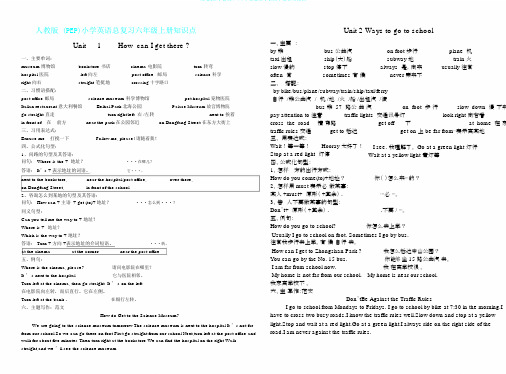
人教版 (PEP)小学英语总复习六年级上册知识点Unit1How can I get there ?一、主要单词:museum 博物馆bookstore 书店cinema 电影院turn 转弯hospital 医院left 向左post office邮局science 科学right 向右straight 笔挺地crossing 十字路口二、习惯语搭配:post office 邮局science museum 科学博物馆pet hospital 宠物医院Italian restaurant 意大利餐馆Beihai Park 北海公园Palace Museum 故宫博物院go straight 直走turn right/left 右 /左转next to 挨着in front of... 在 ...前方near the park 在公园邻近on Dongfang Street 在东方大街上三、习用表达式:Unit 2 Ways to go to school一、主要:by 乘bus 公共汽on foot 步行plane 机taxi 出租ship(大)船subway 地train 火slow 慢的stop 停下always 是,向来usually 往常often 常sometimes 有候never 素来不二、搭配:by bike/bus/plane/subway/train/ship/taxi/ferry自行 /乘公共汽 / 机 /地 /火 /船 /出租汽 /渡bus 乘 57 路公共汽on foot 步行slow down 慢下来pay attention to 注意traffic lights 交通讯号灯look right 向右看cross the road横穿路get off下at home 在家traffic rules 交通get to 抵达get on 上be far from⋯表示离某地Excuse me打搅一下Follow me, please! 请随着我!四、公式化句型:1、问路的句型及其答语:问句: Where is the + 地址?···在哪儿?答语: It’s + 表示地址的词语。
六年级英语上册复习资料1

六年级上册复习资料第一单元重点句型:Her hair was short and her eyes were big.P2: 1.two months old两个月大 2.small and cute又小又可爱3.a primary school student一名小学生4.go to junior high school去中学5.tall and pretty 又高又漂亮P3: 1.(be)born出生 2.look around看向四周 3.find his mum找到他的妈妈4.a round head一个圆脑袋5.a long tail一条长尾巴6.no tail没有尾巴7.meet a turtle遇到一只乌龟8.catch flies捉苍蝇P6(写句子):2. In Photo 2, Ben was a primary school student. He was 11 years old.3. In Photo 3, Mrs Li was a junior high school student. She was 14 years old.4. In Photo 4, Mr Li was a pilot. He was 22 years old.P7(作文):1. In this photo, my mother was a baby. She was 2 months old. Her eyes were big.2. In this photo, my father was a junior high school student. He was 14 years old.His hair was short.作文:I was a baby. I was small and cute. My hair was short.Now, I’m a primary school student. I am tall. My hair is long.第二单元重点句型:How was your summer holiday?It was wonderful. We went to the Great Wall.P8: 1.summer holiday暑假 2.visit my grandparents看望我的祖父母3.go to the beach去沙滩4.play ball games玩球类游戏5.go swimming去游泳6.in the sea在海里7.go to Beijing去北京8.visit my uncle拜访我的叔叔9.some famous parks一些有名的公园10.take a lot of photos照许多照片P10:1.visit her uncle拜访她的叔叔 2.go there去那3.the Great Wall长城4.Tian’anmen Square天安门广场P12:作文:5.the Palace Museum故宫博物馆Hi Peter ,6.enjoy her summer holiday享受她的假期I am now in Beijing .7.during the summer holiday在暑假期间I visited my uncle .8.go back to the UK回到英国I went there by plane.9.spend their holiday度过他们的假期I visited the Great Wall.10. Big Ben大本钟11.the British Museum大英博物馆I went to some famous parks .12.have a good time玩的开心13.pick apples摘苹果I took a lot of photos .14.stay with her grandparents和她的祖父母呆在一起How is your holiday ?15.in the countryside在农村Alice第三单元重点句型:What did you have for breakfast this morning?I had some bread and milk.P14:1.have these吃这些 2.not healthy不健康的 3.drink some milk喝一些牛奶4.eat some fruit吃一些水果5. love hamburgers喜爱汉堡包6.have a little meat吃一点肉7. not too much不能太多8.have breakfast/lunch/dinner吃早饭/午饭/晚饭9.very important非常重要P16:1.a lot of fruit and vegetables许多水果和蔬菜 2.eat a lot of rice吃很多大米3.drink a lot of water喝很多水4.a little sweet food少量的甜食5.play sport做运动6.strong and healthy强壮并且健康7.play sport very often经常做运动8.fat and unhealthy胖并且不健康P17:1.eat before bedtime睡前吃东西 2.have poor eating habits拥有不好的饮食习惯3.have some good eating habits拥有好的饮食习惯4.have very good eating habits拥有非常好的饮食习惯5.well do wn做得好第四单元重点句型:Did you play with Sam last weekend? Yes,I did. / No,I didn’t.P24:1.play with…和…一起玩 st weekend上个周末 3.play chess下棋 4.in my home在我家P26:1.a noisy neighbour一个吵闹的邻居 2.live in a tree住在树上 3.live under the tree住在树下4.every night每个晚上5.make a lot of noise制造许多噪音6.very tired非常累7.make noise制造噪音8.stop making noise停止制造噪音9.dig a hole挖个洞10.very quiet underground地下非常安静11.have a good sleep睡得很香12.sleep in holes睡在洞里P29:作文:Peter is my neighbour. He is 12. I often play chess with him.I sometimes play football with him. Last Sunday, we did the homework.We also played together.第五单元重点句型:In the past, there were many pandas.P30:1.in the past在过去 2.one thousand six hundred 1600 3.in the wild在野外4.South China tiger华南虎5.blue whale蓝鲸6.in danger面临危险P32:1.work with…和…一起工作 2. wild animals野生动物 3.on her way home在她回家的路上4.take care of照顾5.go for a walk散步6.see a rhino看见一只犀牛7.drive away赶走8.live together住在一起9.many months许多个月10.grow up长大11.learn a lot学会了很多11.send A back to B把A送回到B 12.three years later三年以后P33:African elephant----African elephants非洲象red fox---red foxes红狐狸wolf---wolves狼第六单元重点句型:Would you like to have e-friend in other countries?P36:1.in different countries在不同的国家 2.in other countries在其他的国家 3.in the UK在英国4.talk about谈论5.our favourite football teams我们最喜欢的足球队6.in Australia在澳大利亚7.our favourite books and films我们最喜欢的书和电影8.in the US在美国P38:1.the E-friend Club网友俱乐部 2.wear glasses戴眼镜 3.favourite subjects最喜欢的科目4.a junior high school student一名中学生5.write back soon立马回信P44作文:Name: Chinese white dolphin Chinese white dolphins lives in the South China Sea.Colour:grey, pink or white They’re grey, pink or white.Food : fish They eat fish.Live in: the South China Sea Now they’re in danger.Number: about 2500 There are only about 2500 in the wild.第七单元重点句型:Shall we go and see a film this weekend? Sure.P46:go and see a film去看电影Snow White白雪公主 a beautiful princess一位漂亮的公主meet seven little friends遇到七个小矮人an interesting film一个有趣的电影Plice Story警察故事an exciting film一个令人激动的电影 a brave policeman一个勇敢的警察catch bad people抓坏人 next time下一次 on Sunday afternoon在星期天下午P48:once upon a time从前 a magic mirror一面魔镜 the fairest of all最美丽的kill Snow White杀死白雪公主 run away逃跑 the next day第二天 fall asleep睡着作文:1.Snow White:It’s about a beautiful princess. She meets seven little friends in the forest.It’s interesting.2.Police Story:It’s about a brave policeman. He catches bad people.It’s exciting.3.The Monkey Key:It’s about a clever monkey. It’s interesting.第八单元重点句型:What did you see at the museum? I saw a lot of interesting cars.P52:1.a toy bee一只玩具蜜蜂 2.an insect museum一个昆虫博物馆 3.at the museum在博物馆3. other insects其他的昆虫 5.some of them他们中的一些 6.a car museum一个汽车博物馆7. a lot of interesting cars许多有趣的小汽车8.so cool很酷9.go there去那P54:1.in the city在城市 2.go to the museum去博物馆 3.on the second floor在第二层4. many kinds of许多种类5.at the piano在钢琴前6.play songs弹奏歌曲7.beside the piano在钢琴旁边8.a robot dancer一个机器人舞者9.move his head and arms移动头和手臂10.many other interesting robots许多其他有趣的机器人11.have a great time玩的开心P56:作文: A visit to a car museum P57: the Louvre Museum----Paris---I visited a car museum on 14th May. ---art museumIt is big.I saw a lot of interesting cars.第九单元重点句型:How long does it take to get to Shanghai from Beijing by train?It takes about five hours.P58:1.the capital of ... ...的首都 2.a great city一座大城市 3.in the east of...在...的东部5. far away from...离...远 5.each other彼此之间 6P60:1.most tourists大多数的游客 2.love eating dumplings喜爱吃饺子3. a lot of tall buildings许多高的建筑物4.a lot of tourists许多游客5.love eating sushi喜爱吃寿司6. find many museums发现许多博物馆7. fish and chips炸鱼薯条Big Ben---a clock tower---make beautiful sounds第十单元重点句型:It keeps them high in the sky.P68:1.no colour or shape没有颜色和形状 2.no smell or taste没有气味和味道 3.all people所有人4. keep us alive保持我们活着 5.keep them high保持他们高高的P70: 1.the black smoke黑烟 2.make the air dirty使空气变脏 3.so fresh如此的清新4.keep the air clean使空气保持洁净5.plant more trees 种植更多的树6.keep our city clean使城市保持洁净第十一单元重点句型:We get wood from tress. We use wood to make pencils.P74: 1.make our city beautiful使我们的城市变美丽 2.get a lot of things from trees从树那里获得许多东西3. get fruit from trees从树上得到水果4.get wood from trees从树上得到木材4. use wood to...使用木材去... 6.cool the air使空气变凉7.plant more trees种植更多的树P76: 1.have to 不得不 2.fly to the south飞向南方 3.next spring下一个春天 e back回来5. cut down砍掉6.fly to the factory飞向工厂7.look for寻找8.make matches制作火柴作文:We get wood from trees.We use wood to make a lot of things.We use wood to make beds / houses / chairs / matches...植树节(Tree Planting Day):中国on 12th March / 澳大利亚on the Sunday in July第十二单元重点句型:We should stop cutting down so many trees.P80:1.stop throwing rubbish into rivers停止把垃圾扔进河里2. stop cutting down so many trees停止砍伐如此多的树3. stop using plastic bags 停止使用塑料袋P82:1.live on the Earth住在地球上 2.a beautiful place一个美丽的地方3.many different plants and animals许多不同的植物和动物4.clean water and air干净的水和空气5.smoke from cars and factories来自汽车和工厂的烟6.make the air dirty使空气变脏7.get sick生病8.work together一起工作9.pick up rubbish捡垃圾10.plant trees植树11.recycle glass and paper回收玻璃和纸12.bring our own shopping bags带我们自己的购物袋P84:1.cut down trees砍树 2.build more factories and houses建更多的工厂和房子4. write on both sides of paper在纸的两面写字 4.kill wild animals杀死野生动物5. walk or ride a bike more often 更多的走路或骑自行车作文:The Earth is sick.The Earth was clean and beautiful in the past.Now some parts are dirty.We should stop throwing rubbish into rivers.We should stop cutting down so many trees.We should stop using plastic bags.We should pick up rubbish.We should plant trees every year.。
六年级英语上册期末复习资料(人教版六年级上英语全册期末复习提纲)

am 只跟I放在一起be动词 is 主语是单数时用are 主语是复数时用Unit 1 询问一些地点在哪;怎样到达一些地点1.询问地点在哪:Where is the 地点Where is the cinema? 电影院在哪?回答: near(附近)next to(旁边)It’s behind(后面) the 地点in front of(前面)It’s near the zoo. 它在动物园附近。
2. 询问怎样到达一个地点:How can I get to the 地点How can I get there/ here ?How can I get to the cinema? 我怎样到达电影院?回答:turn leftturn right at the 地点 go straightTurn right at the zoo. 动物园右转。
Turn left at the zoo, and then go straight, the cinema is on your left.动物园左转然后直走,电影院在你的左边。
或:You can Take the No.57 bus. 你可以乘坐57路公交车。
人 can take the No.数字 busUnit2 到达一些地点的交通方式doesHow do you go to school? 你怎么去学校?回答:人 go(goes) to school by 交通工具I go to school on foot. She goes to school by bus.2.人 must 动词原形人必须……People on bikes must wear one. 骑自行车的人必须戴一个。
I must pay attention to the traffic lights. 我必须注意交通信号灯。
Unit3 人打算做事1.人 be going to do(动词原形) 人打算(或将要)去做事She is going to see a film. 她打算去看电影。
小学六年级英语上册4-6单元复习资料

Unit 4 I have a pen pal我喜欢集邮2.(1)----what about you ? 你呢?----Me too. 我也是。
(2)--- Let’s go together. 让我们一起去吧。
(3)---- Can he go with us? 他跟我们去吗?----- Sure!We do morning exercises every day. He usuallly goes to school by bike.A:What does Miss White teach? B:Miss white teaches English.Does Miss White teach English? 肯定回答:Yes,she does . 否认回答:No, she doesn’t .Unit 5 What does she do ?①询问职业●——What does he do ?/What is he ?他是做什么的?——He is a doctor.他是一个医生。
●——What do you do ?/What are you ?你是做什么的?——I ’m a student .我是一个学生。
②询问工作的地点●——Where do you work ?你在哪儿工作?——I work in a school .我在一个学校工作。
●——Where does your mother work ?你妈妈在哪儿工作?——She works in a hospital .她在一个医院工作。
一般疑问句:——Does he work in a company ?他在公司工作吗?——Yes ,he does .是的。
③询问怎样去工作——How does your father go to work ?你父亲怎么去上班?——He goes to work by car .他开车去上班。
Unit 6 The story of rain重要句型:1.A:Where does the rain come from?雨来自于哪儿?B:It comes fromthe cloud. 雨来自于云朵.2.A: How can the water become vapour? B: The sun shines and the waterbecomes vapour.A:Where are you from? 你来自于哪?B:I’m from China.我来自于中国.3.A:Let`s plant a flower. How do you do that? 你怎样做呢? B: First,putthe seed in the soil.4.Would should you do then ? 然后你又该怎样做? Water them. Then put it inthe sun .5.描述事情的先后顺序和过程A: How do you plant a tree?B: First dig the soil. Then put the plant in the soil. Next water it often. Wait for it to grow.。
六年级英语上册期末复习材料
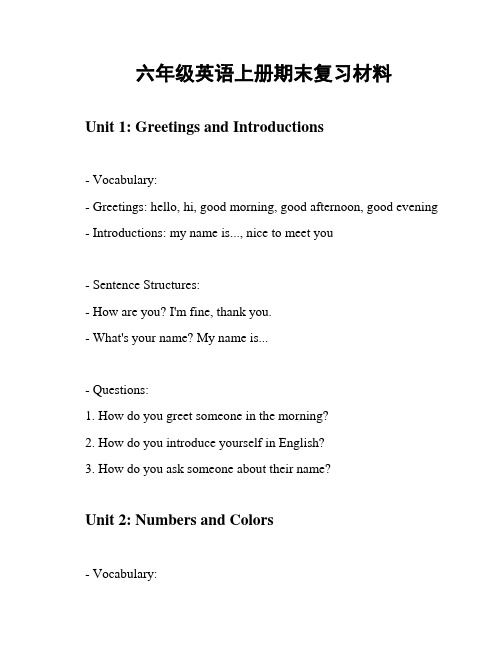
六年级英语上册期末复习材料Unit 1: Greetings and Introductions- Vocabulary:- Greetings: hello, hi, good morning, good afternoon, good evening - Introductions: my name is..., nice to meet you- Sentence Structures:- How are you? I'm fine, thank you.- What's your name? My name is...- Questions:1. How do you greet someone in the morning?2. How do you introduce yourself in English?3. How do you ask someone about their name?Unit 2: Numbers and Colors- Vocabulary:- Numbers: one, two, three, four, five, six, seven, eight, nine, ten - Colors: red, blue, green, yellow, orange, purple- Sentence Structures:- How many...?- The color is...- Questions:1. How do you ask someone about the quantity of something?2. How do you say the color "red" in English?Unit 3: Family and Friends- Vocabulary:- Family: father, mother, brother, sister, grandfather, grandmother - Friends: friend, best friend- Sentence Structures:- This is my...- He/She is my...- Questions:1. How do you introduce your father in English?2. How do you say "best friend" in English?...*Note: This document provides a general overview of the key concepts covered in the sixth grade English textbook. For a more detailed review, please refer to the individual unit materials and exercises.*。
六年级上册英语复习资料
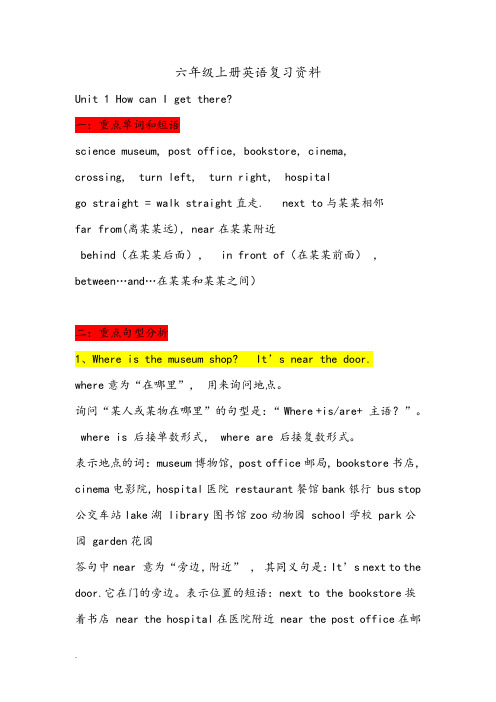
六年级上册英语复习资料Unit 1 How can I get there?一:重点单词和短语science museum, post office, bookstore, cinema,crossing, turn left, turn right, hospitalgo straight = walk straight直走. next to与某某相邻far from(离某某远), near在某某附近behind(在某某后面), in front of(在某某前面),between…and…在某某和某某之间)二:重点句型分析1、Where is the museum shop? It’s near the door.where意为“在哪里”,用来询问地点。
询问“某人或某物在哪里”的句型是:“ Where +is/are+ 主语?”。
where is 后接单数形式, where are 后接复数形式。
表示地点的词:museum博物馆, post office邮局, bookstore书店, cinema电影院, hospital医院 restaurant餐馆bank银行 bus stop 公交车站lake湖 library图书馆zoo动物园 school学校 park公园 garden花园答句中near 意为“旁边,附近” ,其同义句是:It’s next to the door.它在门的旁边。
表示位置的短语:next to the bookstore挨着书店 near the hospital在医院附近 near the post office在邮局附近over there 在那边on Dongfang Street在东方大街上 in front of the school在学校前面2、How can we get there? Turn right at the hospital考查How引导的特殊疑问句,用于提问方式、方法。
六年级上册英语1—4知识点复习全面版

10. There ________(be) some water in the bottle. 11. Mike _______(like) cooking. 12. They _______(have) the same hobby. 13. My aunt _______(look) after her baby carefully. 14. You always _______(do) your homework well. 15. I _______(be) ill. I’m staying in bed. 16. She _______(go) to school from Monday to Friday. 17. Liu Tao _______(do) not like PE. 18. The child often _______(watch) TV in the evening. 19. Su Hai and Su Yang _______(have) eight lessons this term. 20. -What day _______(be) it today? - It’s Saturday.
B: I like collecting stamps. 2. 第三人称单数作主语:He / She + 动词的第三人称单数形 式(does)。例:
He likes collecting stamps, too. 3. Does 引导的一般疑问句,用来确定自己对事情的判断:--Does he / she + 动词原形?--- Yes, he / she does. No, he / she doesn't. 例:
Unit 2 Where Is the Science Museum?
六年级英语上册知识点复习汇总
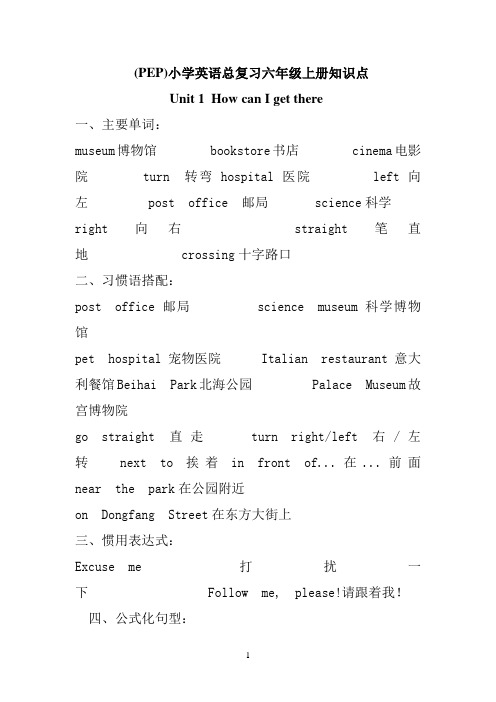
(PEP)小学英语总复习六年级上册知识点Unit 1 How can I get there一、主要单词:museum博物馆bookstore书店cinema电影院turn 转弯hospital医院left向左post office 邮局science科学right向右straight笔直地crossing十字路口二、习惯语搭配:post office邮局science museum科学博物馆pet hospital宠物医院Italian restaurant意大利餐馆Beihai Park北海公园 Palace Museum故宫博物院go straight直走turn right/left右/左转next to挨着in front of...在...前面near the park在公园附近on Dongfang Street在东方大街上三、惯用表达式:Excuse me 打扰一下Follow me, please!请跟着我!四、公式化句型:1、问路的句型及其答语:问句:Where is the + 地点······在哪儿答语:It's + 表示地点的词语(next to the bookstore,near the hospital/post office, over there,on Dongfang Street, infront of the school... )2、询问怎么到某地的句型及其答语:问句:How can +主语+ get (to)+地点·····怎么到·····同义句型:Can you tell me the way to +地点Where is + 地点Which is the way to +地点五、例句:Where is the cinema, please 请问电影院在哪里It's next to the hospital.它与医院相邻。
六年级英语上册重点单词句型语法复习资料
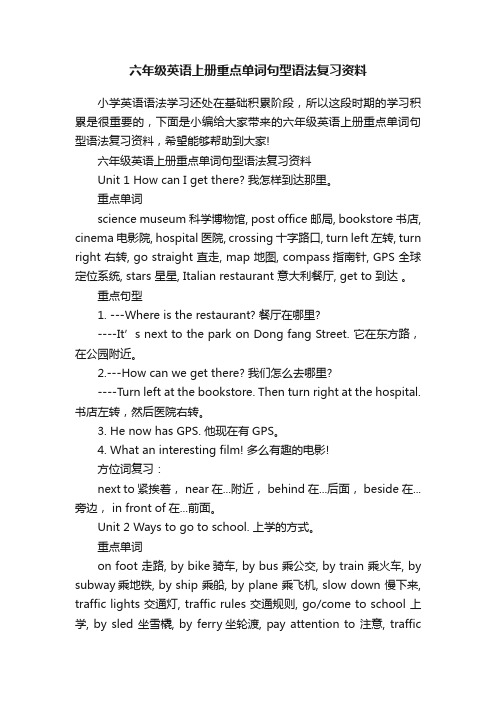
六年级英语上册重点单词句型语法复习资料小学英语语法学习还处在基础积累阶段,所以这段时期的学习积累是很重要的,下面是小编给大家带来的六年级英语上册重点单词句型语法复习资料,希望能够帮助到大家!六年级英语上册重点单词句型语法复习资料Unit 1 How can I get there? 我怎样到达那里。
重点单词science museum 科学博物馆, post office 邮局, bookstore书店, cinema电影院, hospital 医院, crossing 十字路口, turn left 左转, turn right 右转, go straight 直走, map 地图, compass指南针, GPS 全球定位系统, stars 星星, Italian restaurant 意大利餐厅, get to 到达。
重点句型1. ---Where is the restaurant? 餐厅在哪里?----It’s next to t he park on Dong fang Street. 它在东方路,在公园附近。
2.---How can we get there? 我们怎么去哪里?----Turn left at the bookstore. Then turn right at the hospital.书店左转,然后医院右转。
3. He now has GPS. 他现在有GPS。
4. What an interesting film! 多么有趣的电影!方位词复习:next to紧挨着, near在...附近, behind在...后面, beside在...旁边, in front of在...前面。
Unit 2 Ways to go to school. 上学的方式。
重点单词on foot 走路, by bike骑车, by bus 乘公交, by train 乘火车, by subway乘地铁, by ship 乘船, by plane 乘飞机, slow down 慢下来, traffic lights 交通灯, traffic rules 交通规则, go/come to school 上学, by sled 坐雪橇, by ferry坐轮渡, pay attention to 注意, trafficlights交通灯, Stop and wait at a red light 红灯停等一等, slow down and stop at a yellow light 黄灯减速并停下, Go at a green light 绿灯行。
六年级上册英语复习资料
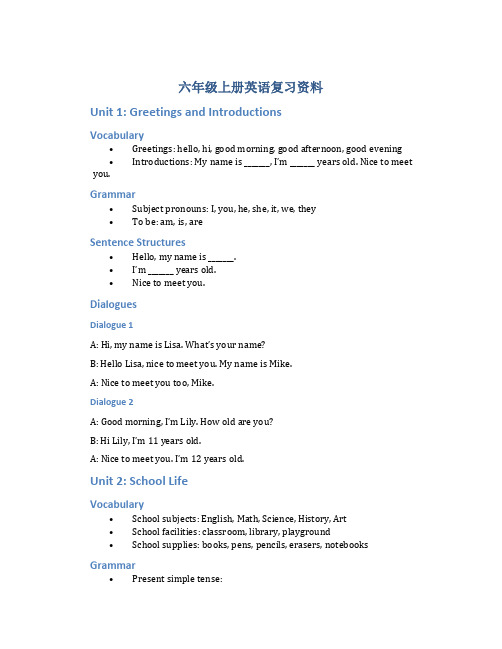
六年级上册英语复习资料Unit 1: Greetings and IntroductionsVocabulary•Greetings: hello, hi, good morning, good afternoon, good evening •Introductions: My name is _______, I’m _______ years old. Nice to meet you.Grammar•Subject pronouns: I, you, he, she, it, we, they•To be: am, is, areSentence Structures•Hello, my name is _______.•I’m _______ years old.•Nice to meet you.DialoguesDialogue 1A: Hi, my name is Lisa. What’s your name?B: Hello Lisa, nice to meet you. My name is Mike.A: Nice to meet you too, Mike.Dialogue 2A: Good morning, I’m Lily. How old are you?B: Hi Lily, I’m 11 years old.A: Nice to meet you. I’m 12 years old.Unit 2: School LifeVocabulary•School subjects: English, Math, Science, History, Art•School facilities: classroom, library, playground•School supplies: books, pens, pencils, erasers, notebooksGrammar•Present simple tense:–Positive: I/You/We/They + verb–Negative: I/You/We/They + don’t + verb–Question: Do + I/You/We/They + verb?Sentence Structures•I like _______.•I don’t like _______.•Do you like _______?DialoguesDialogue 1A: What subjects do you have at school?B: We have English, Math, Science, and History.A: That sounds interesting. Which one is your favorite?B: I like Math the most. What about you?A: I like Science.Dialogue 2A: Do you have any school supplies?B: Yes, I have books, pens, and notebooks.A: Do you like drawing?B: No, I don’t like drawing.Unit 3: Family and FriendsVocabulary•Family members: father, mother, brother, sister, grandparents •Friends: friend, best friend•Adjectives to describe people: kind, funny, smart Grammar•Possessive adjectives: my, your, his, her, our, their Sentence Structures•This is my _______.•He/She is my _______.DialoguesDialogue 1A: Who is the person in the picture?B: This is my mother.A: She looks very kind.B: Yes, she is very kind.Dialogue 2A: Who is your best friend?B: His name is Jack. He is very funny.A: That’s great.Unit 4: Daily ActivitiesVocabulary•Daily routine: wake up, get dressed, eat breakfast, go to school, have lunch, do homework, go to bed•Adverbs of frequency: always, often, sometimes, rarely, never Grammar•Present simple tense:–Positive: He/She/It + verb + s/es–Negative: He/She/It + doesn’t + verb–Question: Does + He/She/It + verb?Sentence Structures•I usually _______.•He/She always _______.•Does she _______?DialoguesDialogue 1A: What time do you usually wake up?B: I usually wake up at 7 o’clock.A: And when do you go to bed?B: I usual ly go to bed at 9 o’clock.Dialogue 2A: Does your brother do his homework every day?B: No, he rarely does his homework.A: Oh, that’s not good.Unit 5: Food and DrinksVocabulary•Food: bread, rice, noodles, chicken, beef, fish, vegetables, fruits •Drinks: water, milk, juice, tea, coffeeGrammar•Countable and uncountable nouns:–Countable: I have two _______.–Uncountable: I have some _______.Sentence Structures•I like eating _______.•I don’t like drinking _______.•Do you like eating _______?DialoguesDialogue 1A: What’s your favorite food?B: My favorite food is pizza.A: That sounds delicious.B: Yes, it’s very tasty.Dialogue 2A: Do you drink milk every day?B: No, I don’t like drinking milk.A: What do you drink then?B: I like drinking juice.ConclusionThis document serves as a review material for the content covered in the first semester of the sixth grade English course. It includes vocabulary, grammar, sentence structures, and dialogues from different units. By studying and practicing these materials, students will be able to reinforce their English language skills and prepare for future lessons.。
六年级英语上册复习资料(陕西旅游版)
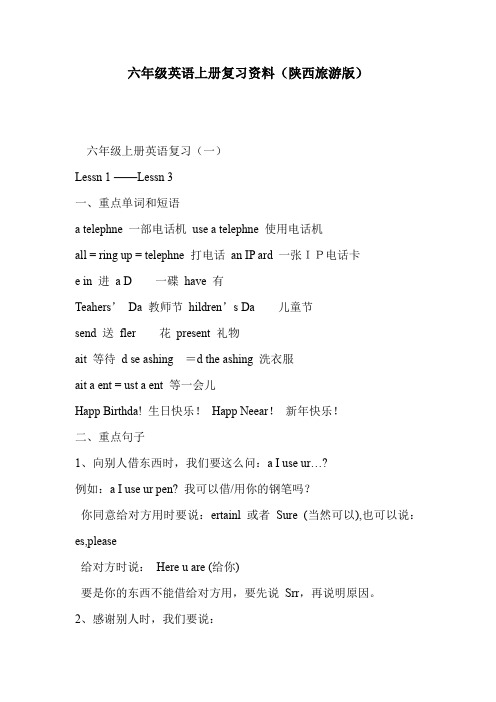
六年级英语上册复习资料(陕西旅游版)六年级上册英语复习(一)Lessn 1 ——Lessn 3一、重点单词和短语a telephne 一部电话机use a telephne 使用电话机all = ring up = telephne 打电话an IP ard 一张IP电话卡e in 进a D一碟have 有Teahers’Da 教师节hildren’s Da儿童节send 送fler花present 礼物ait 等待d se ashing=d the ashing 洗衣服ait a ent = ust a ent 等一会儿Happ Birthda! 生日快乐!Happ Neear!新年快乐!二、重点句子1、向别人借东西时,我们要这么问:a I use ur…?例如:a I use ur pen? 我可以借/用你的钢笔吗?你同意给对方用时要说:ertainl或者Sure (当然可以),也可以说:es,please给对方时说:Here u are (给你)要是你的东西不能借给对方用,要先说Srr,再说明原因。
2、感谢别人时,我们要说:Than u / Than u ver uh / Thans a lt表示不用谢,不客气时,我们可以说:That’s / u’re ele / That’s all right /It’s pleasere/ pleasure / Nt at all3、电话铃响了,拿起电话时说:Hell?(你好),也可以直接告诉对方你是谁:This is … speaing (我是… )4、要找某人时要说:a I spea t … , please?(请找…接电话,好吗?)、在电话中问对方是谁时,要说:h’s that ? 或者h’s alling ?(你是谁?)也可以问对方:Is that … speaing? (你是…吗?)6、问某人在家时:Is … in / at he ? (… 在家吗?)7、uld u lie t d … ? (你想做… 吗?)8、Gd idea! (好主意)9、See u trr ! (明天见) See u ! (再见)10、Let’s send a present t ur teaher(让我们送份礼物给老师吧。
- 1、下载文档前请自行甄别文档内容的完整性,平台不提供额外的编辑、内容补充、找答案等附加服务。
- 2、"仅部分预览"的文档,不可在线预览部分如存在完整性等问题,可反馈申请退款(可完整预览的文档不适用该条件!)。
- 3、如文档侵犯您的权益,请联系客服反馈,我们会尽快为您处理(人工客服工作时间:9:00-18:30)。
六年级英语复复习资料(上)2017六年级上册英语重点句型1、该做某事的时候了。
It is time to do sth .to 后面跟动词原形。
It is time for sth .for后面跟的是名词, 动词ing 形式。
2、"Why not +动词原形"表达向某人提出建议,翻译为:"为什么不?" "干吗不?"3、Shall we+动词原形…?表示征求对方意见,“ 我们好吗?”4、“let’s+动词原形”,"让我们…吧。
"或"咱们…吧。
"5、How/What about…l?提出某种建议,怎么样;好吗? about 为介词,介词后加名词、动词ing 形式、代词等。
6、“have to+动词原形”不得不做某事。
7、“be helpful to+动词原形”有益于做某事。
8、“had better+动词原形”最好做某事。
9、“would like to /want to+动词原形”想要做某事。
10、“make sb +动词原形”使某人做某事。
11、Would you like some ?你想要点?12.How often do/does +主语+动词原形?某人多久一次做13、May/Can I ?我可以…吗?肯定回答Sure/Certainly/Of course(, you can) .否定回答Sorry,you can’t./No,you can’t./I’m afraid not I’m afraid you can’t .跟动词原形归纳不定式符号to+动词原形。
It’s time to+动词原形.Be going to+动词原形.Would like to+动词原形.Want to+动词原形.Be helpful to+动词原形.Be sorry to+动词原形.Have to+动词原形.Go to see a friend. Go out to play.三、助动词+动词原形shall, will,do/does/did+动词原形情态动词+动词原形can , may, must, should, could, might+动词原形四、省略不定式符号to +动词原形Let,make, help + sb +动词原形why not+动词原形had better+动词原形重点句子1、It’s time to play the violin .该拉小提琴了。
2、Can I go out to play?我可以出去玩吗?3、I’ll play the violin right now.我马上将要拉小提琴。
4、How often do you drink milk?你多久喝一次牛奶?How often does he/she drink milk?他/她多久喝一次牛奶?5、What do you do every day?你每天做什么?6、Why not go in your dad’s car?为什么不做你爸爸的车呢?7、We should do something for our earth.我们应该对地球做点事情。
8、We should care for it.我们应该关爱它。
9、we have only one earth.我们只有一个地球。
10、What shall we take?我们将要带些什么呢?11、When and where shall we meet?我们何时何地见面?12、What a heavy rain!多么大的雨!13、It was here just now。
它刚才在这儿。
14、Was/Were there thirty years ago?三十年前有什么吗?Yes,there was/were. No,there wasn’t/weren’t.15、How many students were there at that time?在那个时候有多少学生?16、Where were you yesterday?昨天你在哪儿?17、What did you do?你做了什么?18、Where did you go….?你去了哪儿?19、I’m sorry to hear that.听到那个我很难过。
20、What happened to her?她怎么了?21、Did you..?你做什么了吗?Yes,I did./ No, I didn’t.22、Who did you go with?谁跟你去?23、What do you think of our party?你认为我们的聚会怎么样?24、They acted it well.他们表演的很给力。
25、How did you go there?怎么去哪儿?26、Sorry. It doesn’t matter.对不起,没关系。
本学期出现的词汇Play the violin 拉小提琴,do eye exercises做眼保健操,play sports参加体育运动,learn English 学英语,have a rest休息一下,take out the book拿出书,brush one’s teeth刷牙.right now立刻,马上,half past几点半,go out to play出去玩It’s time to 该做…了,of course当然,for an hour持续一个小时,at that time 在那时,take a walk散步,play ping-pong打乒乓球,play tennis打网球,go boating去划船,go skating去滑冰go shopping去购物,look healthy看起来健康,healthy food健康的食物,a lot of许多,how often多久一次,every day每天,be good for对…好,in the morning在上午,in the afternoon在下午,twice a week一周两次,once a month一月一次,three times三次,do well in擅长run after追赶,in the day在白天,at night在晚上,pick flowers摘花,cut down trees砍树,make the air dirty污染空气,waste water浪费水,drive a car开车,care for the earth关爱地球,have to 不得不,必须,why not 为什么不,World Car Free Day世界无车日,because因为,do something for为…做些事,go to work上班,on foot步行,live on 住在…上,sometimes有时,too many/much太多,only one唯一的,plant more trees载更多的树,do bad things to对…7做坏事,损坏…,help the animals帮助动物be helpful to对做…有用,had better最好,make the air clean 净化空气,go on a picnic 去野餐take out of 从…取出put into 放进…里面get to the park 到达公园meet at the gate 在大门口会合Have a good time .玩得开心点be free 空闲What’s up? 怎么啦?at the foot of在…脚下come back 返回get to 到达on weekends在每个周末,have the picnic野餐,too far太远next Saturday下周六,a little一点儿,Old People’s Home养老院,read books读书,sounds good听起来不错,litter on the floor 乱扔垃圾,in the tree在树上,too small太小,scarf(围巾)wallet (钱包)sunglasses (太阳镜)gloves(手套)warm jacket(棉夹克)rain boots(雨靴)school bag(书包)heavy重的,大的,lost丢的,in front of在…前面,just now刚才,yesterday昨天,behind 在..后面,last night昨晚,too bad太糟糕,still仍然,hundred百,thousand千,thirty years ago 三十年前,wear穿,on a rainy day 在雨天,watch a show (看表演)look after (照顾,照看)do housework (做家务)see a friend (看望朋友)have a match (举行比赛)go away (离开)go away from home离开家busy忙, work工作, hear听到,last weekend上周末,make the bed铺床,do the dishes洗餐具,clean the windows擦窗户,water the flowers浇花,cook the meal 做饭,wash the clothes洗衣服,in the hospital 在医院里,in hospital住院,sounds great听起来棒极了,be sorry to对..难过happen发生,about关于,ill in bed,卧病在床play beach volleyball打沙滩排球,visit the museum参观博物馆,buy some gifts买些礼物,eat sea food吃海鲜,make a cake做蛋糕,the Great Wall长城,the Terra-cotta Warriors秦兵马俑the West Lake 西湖,Mount Tai 泰山,Huang guo shu Falls黄果树瀑布,the Stone Forest石林,stay at home 呆在家。
learn to学着做,sounds interesting 听起来有趣,delicious美味的,summer holiday暑假,winter holiday寒假,by train 乘火车,on the first day 在第一天,the next day 第二天,次日,the last day最后一天,Tian’anmen Square天安门广场,Beijing Duck 北京烤鸭,take photos照相,go on a trip 去旅行,places of interest名胜古迹,balloons 气球,candies糖果,dolls洋娃娃,flowers 花儿,gifts礼物,colorful lights彩灯,laugh 笑,cry哭,tell a joke讲笑话,act a play演话剧,play the guitar弹吉他,win a gift赢得礼物,think of认为,short play短剧,funny 有趣的,可笑的,at the party在聚会上,everyone每个人,everything每一件事,Class One一班,at the beginning开始,after that 那之后,finally最后的,excited令人兴奋的,TV show电视节目ask a question问问题,make a sentence造句,greet one’s partner问候对方词性转化;词性转化一、名词或动词变形容词。
